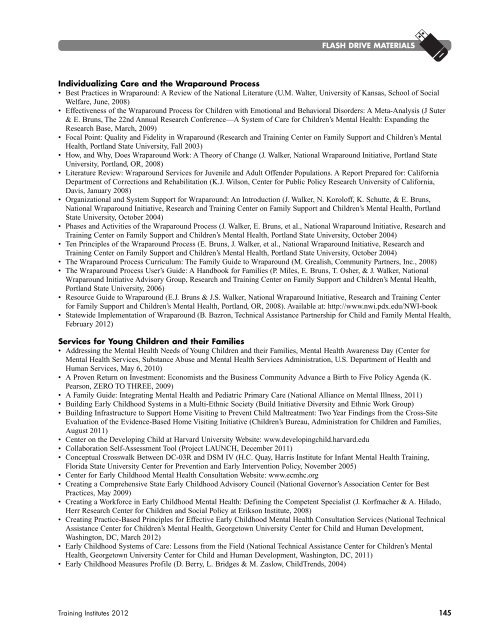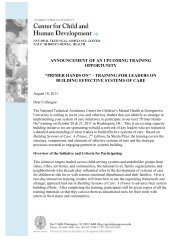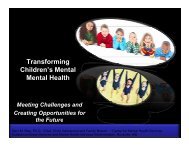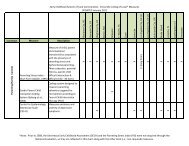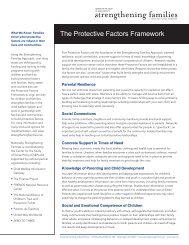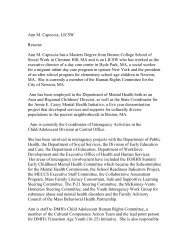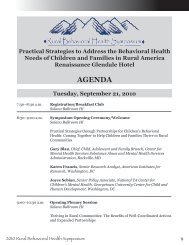Training Institutes 2012 - National Technical Assistance Center for ...
Training Institutes 2012 - National Technical Assistance Center for ...
Training Institutes 2012 - National Technical Assistance Center for ...
Create successful ePaper yourself
Turn your PDF publications into a flip-book with our unique Google optimized e-Paper software.
Individualizing Care and the Wraparound Process<br />
• Best Practices in Wraparound: A Review of the <strong>National</strong> Literature (U.M. Walter, University of Kansas, School of Social<br />
Welfare, June, 2008)<br />
• Effectiveness of the Wraparound Process <strong>for</strong> Children with Emotional and Behavioral Disorders: A Meta-Analysis (J Suter<br />
& E. Bruns, The 22nd Annual Research Conference—A System of Care <strong>for</strong> Children’s Mental Health: Expanding the<br />
Research Base, March, 2009)<br />
• Focal Point: Quality and Fidelity in Wraparound (Research and <strong>Training</strong> <strong>Center</strong> on Family Support and Children’s Mental<br />
Health, Portland State University, Fall 2003)<br />
• How, and Why, Does Wraparound Work: A Theory of Change (J. Walker, <strong>National</strong> Wraparound Initiative, Portland State<br />
University, Portland, OR, 2008)<br />
• Literature Review: Wraparound Services <strong>for</strong> Juvenile and Adult Offender Populations. A Report Prepared <strong>for</strong>: Cali<strong>for</strong>nia<br />
Department of Corrections and Rehabilitation (K.J. Wilson, <strong>Center</strong> <strong>for</strong> Public Policy Research University of Cali<strong>for</strong>nia,<br />
Davis, January 2008)<br />
• Organizational and System Support <strong>for</strong> Wraparound: An Introduction (J. Walker, N. Koroloff, K. Schutte, & E. Bruns,<br />
<strong>National</strong> Wraparound Initiative, Research and <strong>Training</strong> <strong>Center</strong> on Family Support and Children’s Mental Health, Portland<br />
State University, October 2004)<br />
• Phases and Activities of the Wraparound Process (J. Walker, E. Bruns, et al., <strong>National</strong> Wraparound Initiative, Research and<br />
<strong>Training</strong> <strong>Center</strong> on Family Support and Children’s Mental Health, Portland State University, October 2004)<br />
• Ten Principles of the Wraparound Process (E. Bruns, J. Walker, et al., <strong>National</strong> Wraparound Initiative, Research and<br />
<strong>Training</strong> <strong>Center</strong> on Family Support and Children’s Mental Health, Portland State University, October 2004)<br />
• The Wraparound Process Curriculum: The Family Guide to Wraparound (M. Grealish, Community Partners, Inc., 2008)<br />
• The Wraparound Process User’s Guide: A Handbook <strong>for</strong> Families (P. Miles, E. Bruns, T. Osher, & J. Walker, <strong>National</strong><br />
Wraparound Initiative Advisory Group, Research and <strong>Training</strong> <strong>Center</strong> on Family Support and Children’s Mental Health,<br />
Portland State University, 2006)<br />
• Resource Guide to Wraparound (E.J. Bruns & J.S. Walker, <strong>National</strong> Wraparound Initiative, Research and <strong>Training</strong> <strong>Center</strong><br />
<strong>for</strong> Family Support and Children’s Mental Health, Portland, OR, 2008). Available at: http://www.nwi.pdx.edu/NWI-book<br />
• Statewide Implementation of Wraparound (B. Bazron, <strong>Technical</strong> <strong>Assistance</strong> Partnership <strong>for</strong> Child and Family Mental Health,<br />
February <strong>2012</strong>)<br />
Services <strong>for</strong> Young Children and their Families<br />
• Addressing the Mental Health Needs of Young Children and their Families, Mental Health Awareness Day (<strong>Center</strong> <strong>for</strong><br />
Mental Health Services, Substance Abuse and Mental Health Services Administration, U.S. Department of Health and<br />
Human Services, May 6, 2010)<br />
• A Proven Return on Investment: Economists and the Business Community Advance a Birth to Five Policy Agenda (K.<br />
Pearson, ZERO TO THREE, 2009)<br />
• A Family Guide: Integrating Mental Health and Pediatric Primary Care (<strong>National</strong> Alliance on Mental Illness, 2011)<br />
• Building Early Childhood Systems in a Multi-Ethnic Society (Build Initiative Diversity and Ethnic Work Group)<br />
• Building Infrastructure to Support Home Visiting to Prevent Child Maltreatment: Two Year Findings from the Cross-Site<br />
Evaluation of the Evidence-Based Home Visiting Initiative (Children’s Bureau, Administration <strong>for</strong> Children and Families,<br />
August 2011)<br />
• <strong>Center</strong> on the Developing Child at Harvard University Website: www.developingchild.harvard.edu<br />
• Collaboration Self-Assessment Tool (Project LAUNCH, December 2011)<br />
• Conceptual Crosswalk Between DC-03R and DSM IV (H.C. Quay, Harris Institute <strong>for</strong> Infant Mental Health <strong>Training</strong>,<br />
Florida State University <strong>Center</strong> <strong>for</strong> Prevention and Early Intervention Policy, November 2005)<br />
• <strong>Center</strong> <strong>for</strong> Early Childhood Mental Health Consultation Website: www.ecmhc.org<br />
• Creating a Comprehensive State Early Childhood Advisory Council (<strong>National</strong> Governor’s Association <strong>Center</strong> <strong>for</strong> Best<br />
Practices, May 2009)<br />
• Creating a Work<strong>for</strong>ce in Early Childhood Mental Health: Defining the Competent Specialist (J. Korfmacher & A. Hilado,<br />
Herr Research <strong>Center</strong> <strong>for</strong> Children and Social Policy at Erikson Institute, 2008)<br />
• Creating Practice-Based Principles <strong>for</strong> Effective Early Childhood Mental Health Consultation Services (<strong>National</strong> <strong>Technical</strong><br />
<strong>Assistance</strong> <strong>Center</strong> <strong>for</strong> Children’s Mental Health, Georgetown University <strong>Center</strong> <strong>for</strong> Child and Human Development,<br />
Washington, DC, March <strong>2012</strong>)<br />
• Early Childhood Systems of Care: Lessons from the Field (<strong>National</strong> <strong>Technical</strong> <strong>Assistance</strong> <strong>Center</strong> <strong>for</strong> Children’s Mental<br />
Health, Georgetown University <strong>Center</strong> <strong>for</strong> Child and Human Development, Washington, DC, 2011)<br />
• Early Childhood Measures Profile (D. Berry, L. Bridges & M. Zaslow, ChildTrends, 2004)<br />
<strong>Training</strong> <strong>Institutes</strong> <strong>2012</strong><br />
FLASH DRIVE MATERIALS<br />
145


